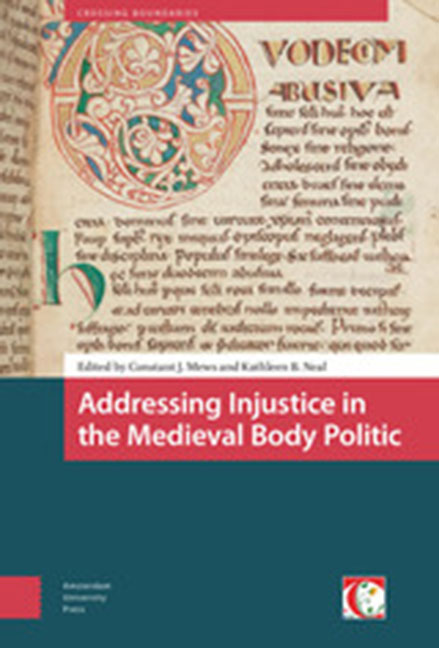Book contents
- Frontmatter
- Contents
- Acknowledgements
- Abbreviations
- Note on References
- List of Tables and Illustrations
- Introduction: Justice and its Abuse in the Medieval Body Politic
- 1 The De XII abusiuis saeculi: Contexts and Textual Traditions
- 2 The Irish Background to the De XII abusiuis saeculi
- 3 ‘Each in the Calling to Which They are Called’: Images of Authority in the De XII abusiuis saeculi
- 4 Transforming Irish Traditions: De XII abusiuis saeculi and Justice in the Frankish World, c. 750–1050
- 5 The Unjust King and the Negligent Bishop: Addressing Injustice in Eleventh and Twelfth-Century England and Germany
- 6 Reflecting on Abuses in Religious Life: From The Twelve Abuses of the Cloister to The Cloister of the Soul
- 7 Preaching the Body Politic: John of Wales and Franciscan Political Thought in the Late Thirteenth Century
- 8 Justice and Its Abuses in the Speculum justiciariorum
- 9 Addressing Abuses and Injustice in the Court of Philip the Fair: The De informatione principum of Durand of Champagne
- 10 ‘Perfect Justice Weighs Everything on a Balanced Scale’: Italian Friars on Equity, the Common Good, and the Commune c. 1270–c. 1310
- 11 Some Late Franciscan Rewritings of the Twelve Abuses
- Appendix: On the Twelve Abuses of the Age A Translation
- Bibliography
- Index of Biblical References
- Index of Manuscripts
- General Index
Introduction: Justice and its Abuse in the Medieval Body Politic
Published online by Cambridge University Press: 14 February 2024
- Frontmatter
- Contents
- Acknowledgements
- Abbreviations
- Note on References
- List of Tables and Illustrations
- Introduction: Justice and its Abuse in the Medieval Body Politic
- 1 The De XII abusiuis saeculi: Contexts and Textual Traditions
- 2 The Irish Background to the De XII abusiuis saeculi
- 3 ‘Each in the Calling to Which They are Called’: Images of Authority in the De XII abusiuis saeculi
- 4 Transforming Irish Traditions: De XII abusiuis saeculi and Justice in the Frankish World, c. 750–1050
- 5 The Unjust King and the Negligent Bishop: Addressing Injustice in Eleventh and Twelfth-Century England and Germany
- 6 Reflecting on Abuses in Religious Life: From The Twelve Abuses of the Cloister to The Cloister of the Soul
- 7 Preaching the Body Politic: John of Wales and Franciscan Political Thought in the Late Thirteenth Century
- 8 Justice and Its Abuses in the Speculum justiciariorum
- 9 Addressing Abuses and Injustice in the Court of Philip the Fair: The De informatione principum of Durand of Champagne
- 10 ‘Perfect Justice Weighs Everything on a Balanced Scale’: Italian Friars on Equity, the Common Good, and the Commune c. 1270–c. 1310
- 11 Some Late Franciscan Rewritings of the Twelve Abuses
- Appendix: On the Twelve Abuses of the Age A Translation
- Bibliography
- Index of Biblical References
- Index of Manuscripts
- General Index
Summary
Abstract
This essay introduces the De XII abusiuis saeculi and its influence in medieval thought through reflecting on the way it presents the notion of iustitia, a term that can mean both righteousness in a biblical context, but also justice in the sense of equity and fairness in social relationships. While the ninth abuse, an unjust king (rex iniquus), has been recognized as laying a foundation for the ‘Mirror of Princes’ genre, we argue, introducing the various essays in this volume, that DDAS was re-interpreted in many different contexts.
Keywords: Justice, medieval ethics, mirrors of princes, medieval political theory, medieval scriptural exegesis
Failures in justice within the body politic are a common theme in medieval writing. In this volume, we take as our principal point of departure a short but relatively little studied treatise on this subject written in Ireland in around the mid-seventh century and known as the De XII abusiuis saeculi or The Twelve Abuses of the Age. It offers a critique of various kinds of behaviour, as manifested by various groups in society, based on injunctions from scripture. Its prologue succinctly articulates these moral lapses in a list that was itself widely copied and stimulated many adaptations between the late eighth and sixteenth centuries:
a wise man without good works, an old man without religion, a youth without obedience, a rich man without almsgiving, a woman without modesty, a lord without moral strength, a contentious Christian, a proud pauper, an unjust king, a negligent bishop, common folk without discipline, a people without law. Thus, justice is suffocated. These are the twelve abuses of the age through which the wheel of the age, if one is within it, is deceived, and without any impeding support of justice is propelled into the darkness of hell through the just judgement of God.
It is not easy to decide how to translate these words. Virtus can mean both virtue and strength; iniquus evokes a sense not just of being morally bad, but of being inequitable or unfair, but these translations are perhaps not as strong as unjust. Iustitia, when evoked in a biblical context, is sometimes rendered as righteousness in a global moral sense. The prologue to DDAS reveals its centrality to the work as a whole. The question must be asked, however, what iustitia means in this work.
- Type
- Chapter
- Information
- Addressing Injustice in the Medieval Body Politic , pp. 15 - 34Publisher: Amsterdam University PressPrint publication year: 2023

